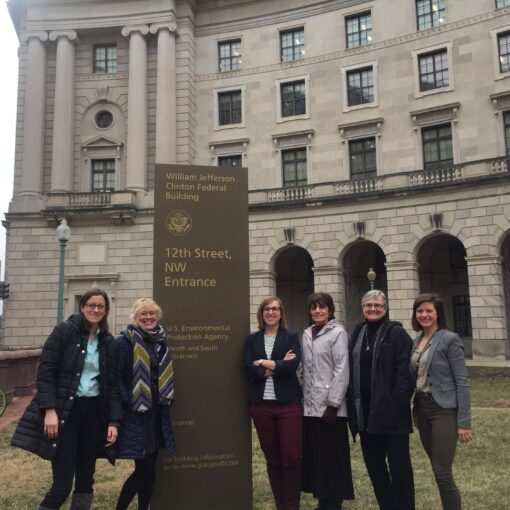 This blog series follows the national nursing organization members of the Nursing Collaborative on Climate Change and Health. The Nursing Collaborative, formed in partnership with the Alliance of Nurses for Healthy Environments and Climate for Health, is a combined effort among nursing organizations to build visible leadership on climate as a health priority. This nationwide network of organizations will be instrumental in moving the profession forward in addressing climate change, creating a climate-literate nursing community, engaging all stakeholders in connecting climate and health, and building collective support and action for solutions. Learn more about the Nursing Collaborative here.
This blog series follows the national nursing organization members of the Nursing Collaborative on Climate Change and Health. The Nursing Collaborative, formed in partnership with the Alliance of Nurses for Healthy Environments and Climate for Health, is a combined effort among nursing organizations to build visible leadership on climate as a health priority. This nationwide network of organizations will be instrumental in moving the profession forward in addressing climate change, creating a climate-literate nursing community, engaging all stakeholders in connecting climate and health, and building collective support and action for solutions. Learn more about the Nursing Collaborative here.
July’s blog post features Lisa Campbell, DNP, RN, PHNA-BC, Chair of the Public Health Nursing section of the American Public Health Association, a founding member of the Nursing Collaborative on Climate Change and Health. The Public Health Nursing section focuses on advancing the development of public health nursing practice and research that promotes healthy communities, health equity, and public health policy. We spoke with Dr. Campbell about the connection between climate, health, and nursing and what the Public Health Nursing (PHN) section is doing to address climate change.
ANHE: Why is understanding climate change important for nurses?
Understanding the connection between climate change and health is important for nurses because it affects almost everything in our nursing practice. We know and are already seeing how climate exacerbates health conditions and affects the populations and communities we serve. When we look at the issue of extreme weather events made worse by climate change, public health nurses need to be ready and able to address the issue of disaster preparedness in community settings. This means making sure nurses are preparing communities for the upcoming hurricane or wildfire season and educating on where to go during an evacuation.
Nurses also need to ready themselves to think about the context of a whole host of diseases, not just physical, but mental health issues as well. Environmental changes, especially high heat and disaster events, can lead to higher levels of stress, even in the absence of mental health disorders, and affect tempers which can impact incidence of child abuse and domestic violence. It is important for nurses to be aware of all ramifications of climate change whether it be at a community, population, or systems level.
ANHE: What is your organization currently doing to increase awareness and engagement of your membership around climate change and health?
Last year, the American Public Health Association (APHA) deemed the year’s theme as the year of climate change and health to help raise awareness on this issue among health professionals. Aligned with APHA ’s theme, the PHN section worked to incorporate climate change topics into the 2017 annual meeting to not only educate nurses but to showcase the work that nurses are doing around climate and health. The PHN section works closely with the Alliance of Nurses for Healthy Environments and the Environment section of APHA to better address environmental issues, such as climate, from a public health perspective.
The PHN section is also a member of the Quad Council Coalition of Public Health Nursing Organizations and part of task force that updates and revises community/public health nursing competencies. We just completed the revisions to the 2018 competencies and deliberately threaded throughout environmental changes and emergency preparedness, highlighting what nurses need to know at all levels of practice.
ANHE: How has your organization’s participation in the Nursing Collaborative on Climate Change and Health helped to elevate climate change as a health imperative?
As a member of the Nursing Collaborative on Climate Change and Health our efforts around this issue have become more intentional. We have appointed two section members to serve as representatives to the Nursing Collaborative to help guide our work. Our two appointees send out weekly emails specifically focused on climate change and health. The messages include quick sound bites of information with links so that members can educate themselves on the various aspects of climate-related impacts. While we do talk about the environment in the mission for the PHN section, we are working to include more specific information for nurses on the section webpage to better elevate climate change as a health issue. Through our participation in the Nursing Collaborative, we will continue to incorporate presentations focused on climate and health for members within the organization, but we also work to provide this content to other civic and local organizations.
ANHE: What recommendations do you have for nurses or other nursing organizations that would like get involved in addressing climate change, such as within their health settings or communities?
My recommendations for nursing organizations is that they need to be intentional about elevating the issue of climate and health. This is something that needs to be well thought out and a specific plan developed for strategic organizational actions.
For the individual nurse, they can start by educating themselves, assessing their gaps, and then utilizing websites like ANHE’s to learn more about the issue. Nurses can then talk with the leadership either of a nursing organization they are affiliated with or within the setting they work about climate and health and what types of actions they can take to elevate the issue. If nurses don’t feel comfortable working with leadership quite yet, they can take action by writing opinion pieces for a local newspaper or becoming involved with community and local groups. In all aspects, however, it’s essential that nurses work with the community on these issues. For example, in planning for disaster preparedness and response usually health systems and various organizations work closely together, but the community must also be queued in, so their needs are adequately addressed.
ANHE: Is there anything else you would like to add?
I hope that more nurses will consider running for elected office to help make a difference in how our policymakers develop policy. Nurses look at policy through a health lens and as elected officials we can work to shift towards a focus on health in all policies.




